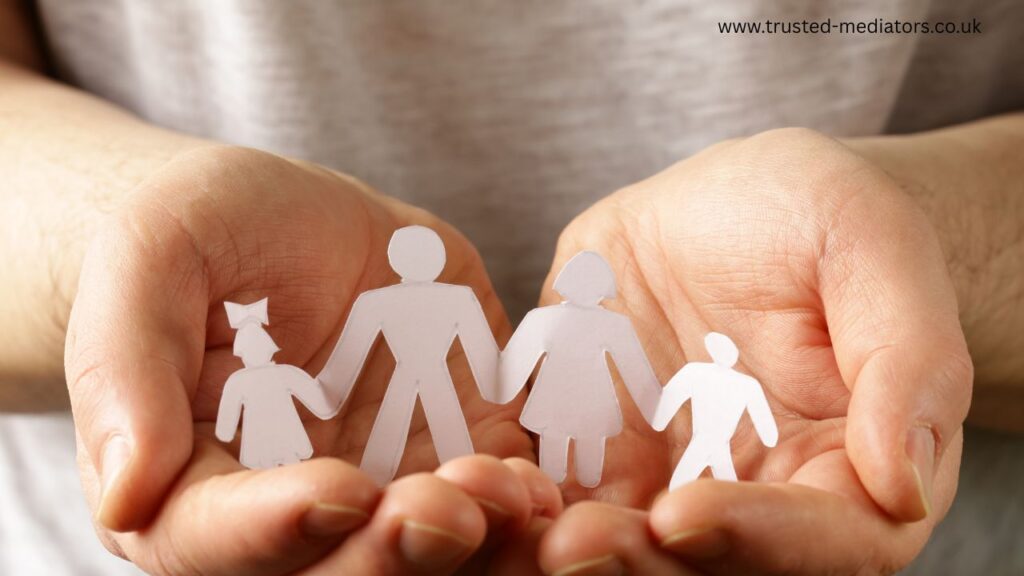How long does mediation take? The mediation process helps people solve family disputes when you are unable to find solutions around divorce, separation or child arrangement disputes. A trained mediator talks with both sides and helps them work through problems. Typically, there is no strict deadline or standard timeline for resolving mediation cases, as the duration can vary depending on the complexity of the issues and the willingness of both parties to reach an agreement. Sessions may take weeks or months, but mediators aim to reach a resolution as efficiently as possible.
The goal is to find an answer that everyone to accept. To find solutions when you are unable to agree. This is different from going to court, which can be tense and painful for everyone involved. In UK family law, mediation works to help you see each other’s side.
The mediator works to make sure the needs and concerns of everyone, even children, get looked at. Mediation guides people to a way of solving things together.It diffuses tension and keeps the conversation productive and moving forward.

Understanding Mediation for Family Disputes
Disagreements in families can bring up strong, painful feelings and feel hard to solve. The mediator helps you talk about what is causing any problems or disagreements. Mediation gives you the chance to find answers without going to court. The mediator uses communication and an expertise in family law. Mediation creates a safe place to talk about things like child support or changes in child arrangements.
Family mediation is a way for families to solve problems with the help of a neutral third party who is not involved personally in your family. The mediator listens to each side and helps everyone talk and work together. It lets people find answers they all agree on. Mediation helps family members do this in a fair and calm way.
When Is Mediation Used in Family Cases?
You usually find mediation helps when parents have problems about who is going to have the children and when. Or when couples need to make arrangements over finances following divorce or separation. It helps people talk things to find solutions out rather than fight in court. Mediation helps you talk and cut down on arguments.
The Mediation Process Step-by-Step
To understand the mediation process, there are a few main steps you need to know. The first step everyone must do is to book your mediation information assessment meeting (MIAM) for you to learn about the mediation process and for the mediation learn about how they can help.
From there as long as the process is right for all of you, a trained mediator will help you and the other person talk things out. The mediator does not take sides. Their job is to bring out what each person wants and help both of you talk openly. They want to help you reach agreements so you do not have to go to court. The goal is to find a way to work it out together through mediation.
What Happens During Each Mediation Session?
During a mediation session, you will be encouraged to talk about how you see the conflict. A mediator helps start the conversation and keeps it going. They make things clearer and helps everyone talk to each other. A mediation session aims for everyone to find and agree on a solution and to find a way forward.
How Long Is A Mediation Session Usually?
Most of the time, one session of family mediation takes between one and three hours. This gives the mediator enough time to help everyone talk in a good way and for each person to share their worries. The length of the session can be longer or shorter based on how complicated the family problems and disputes are. If the situation is more involved, the mediation session may take more time to work through.
Can Mediation Be Completed in One Session?
Some family problems can be sorted out with mediation in just one session. But, sometimes, mediation needs more than one This helps deal with more difficult issues and makes sure everyone feels they are being listened to. If you come to mediation with everyone in agreement and a plan it is more likely that agreements can be reached quicker.
Coming to an agreement can depend on how simple or hard the situation is. No two families are the same and so each case of mediation is going to be personal to you and your issues.
Some situations require extra mediation to sort out everything. If there are signs that some problems are not solved, this means more sessions are needed. An agreement is only possible when all sides feel their concerns are handled in the mediation.
What Affects How Long Mediation Takes?
How long does mediation take? There are several factors that can affect how long the mediation process around family disputes will take. The kind of problems and how tricky they are will decide how many mediation sessions you will need. If the issues are more detailed, the mediation may have to go on for some extra time so all sides can talk things through.
The attitude and how ready people are in the mediation also has a big effect. A complainant who is motivated, and a defendant open to agree or talk, can help the talks move faster. If anyone holds back or does not join in, the whole timeline can stretch out. This may make the mediation services less useful or feel like they take longer than needed.
Does Mediation Mean Everyone Needs To Agree?
Success in the mediation process depends on how willing and ready everyone is to work together. A good attitude helps open up the conversation. It makes it easier for your trained mediator to help the conversation move forward.
It helps to set clear goals ahead of time and talk things through before mediation starts. When people do this, they feel more ready to deal with the dispute. The goal of mediation is to help you find solutions even if you come into mediation thinking that agreements won’t be found. You may find that you are not able to come to a full agreement in mediation but the mediator will still be able to document what was agreed in a memorandum of understanding. Even if only a partial agreement is found it is still a way towards finding answers.
What is Quicker, Mediation or Court?
There is a big difference in how long mediation and a court hearing may take. Mediation usually works faster. An initial MIAM session with a mediator can be set up in as quick as a few days. Following your assessment meeting you are normally able to book a mediation with in a few weeks.
The court process however, may take months or even several years to finish. Mediation uses a neutral third party like a trained mediator.
Mediation can solve the problem faster and helps people feel more confident and in control of the outcome. It makes it easier for everyone in the dispute to agree and move on, instead of waiting for a long court decision.

Tips to Help Speed Up the Mediation Process
Getting prepared is important to move along the mediation process faster. You should have any documents or financial information with you. This helps to keep the facts straightforward before you start. If people work together, they can sort out talks quickly and try for a good settlement agreement that works for all involved.
Preparing Documents and Financial Disclosure
Document preparation and financial disclosure are very important in the mediation process. When you put together needed documents before mediation sessions, it is easier to see what’s going on. This way, you know where you stand. Some of the main things you need are income statements, lists of what you own, and records of costs for child support, or other family law needs.
Communication Strategies to Avoid Delays
Open and open communication is important in speeding up the mediation process. When you set clear expectations with everyone, it helps to cut down on confusion. Using email to send quick updates and having set times to check in keeps things moving forward. A support person can help lead talks and makes sure that all concerns are heard in a better way. When people feel free to speak openly, it helps everyone work together. This also lets a neutral third party lead the mediation. All of this can help everyone reach a settlement agreement faster.
Conclusion – How Long Does Mediation Take
Handling family disputes with mediation can help everyone feel more supported. It gives families a way to work things out together. During the mediation process, you and the other people involved can talk openly. A trained mediator is there to guide you as you try to find answers that work for everyone.
Mediation depends on people being ready to sit down, speak honestly, and talk about what is really going on. The time it takes can be different for each family. But the main goal is to reach a settlement agreement that is fair and takes care of what each person needs. Mediation works best when the mediator helps everyone feel heard, so family life can get back on track after things are settled.
Frequently Asked Questions – How Long Does Mediation Take?
Is there a set deadline to complete family mediation in the UK?
In the UK, there is not a set date by law to finish family mediation. The people in it are urged to work out problems in their own time. If you set your own timelines, you might be able to get things sorted faster. But it is good to make sure you talk through every point fully during mediation.
What can I do if I feel mediation is taking too long?
If mediation is taking a long time, you can talk with the mediator about what you feel is slowing things down. The mediator can help by sharing their thoughts. They might offer some ways to make the meetings go smoother and quicker. Also, make sure you have all your important papers ready before the sessions. This helps things move faster and makes it easier to solve problems. If you feel that mediation isnt progressing as you had hoped you can always consider family court.
Does family mediation always resolve issues faster than going to court?
Family mediation can help people solve problems faster than going to court. This is because it lets everyone have a say in the outcome. The speed depends on how many things need to be worked out and if people agree to help. A lot of families finish mediation quickly, but some may still need more time to talk things out. Mediation gives all a chance to find answers sooner, but it may be slow if the talk is hard.
